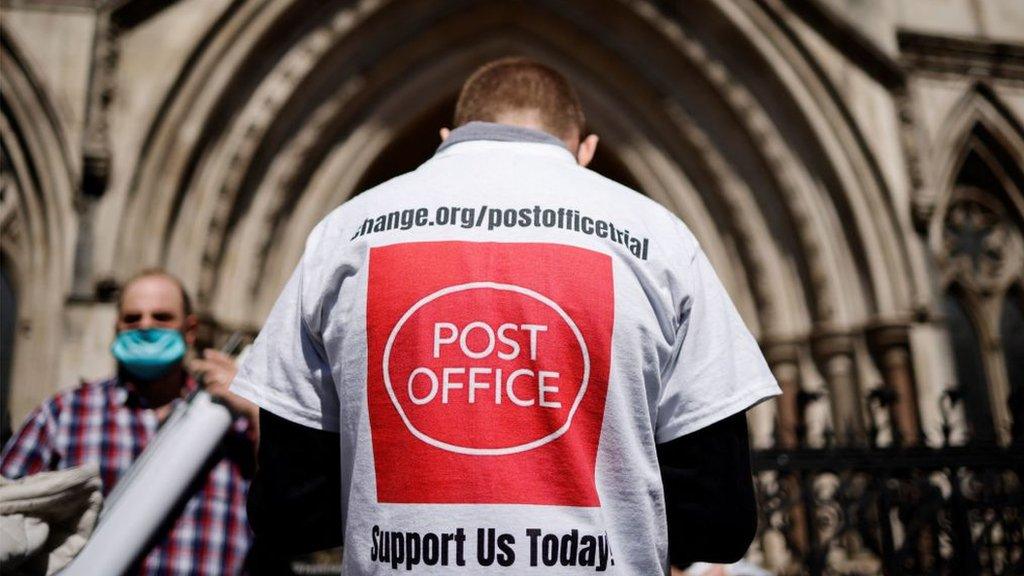Post Office IT scandal cases could be miscarriages of justice
- Published

Rab Thomson said he could now hold his head up in the community
The convictions of six former sub-postmasters for embezzlement and fraud may be miscarriages of justice, a Scottish review has found.
The Scottish Criminal Cases Review Commission (SCCRC) considered the cases after a scandal over the Post Office's faulty IT system, Horizon.
The High Court will now decide if the convictions should be quashed, paving the way for compensation.
They will be the first cases to go to appeal in Scotland.
About 80 convictions have been overturned in other parts of the UK.
The SCCRC said the Horizon scandal was a linking factor in all six cases which have now been referred to the High Court of Justiciary.
The commission's chairman, Bill Matthews, said: "The cases we have referred today to the High Court are exceptional in the commission's caseload as each one is founded upon the operation of the Post Office's computer system, Horizon, and the conduct of Post Office Ltd."
One of the six former sub-postmasters involved has since died, but an application was lodged on their behalf.
Between 2000 and 2014, the Post Office prosecuted 736 sub-postmasters and sub-postmistresses based on information from the Horizon system.

Some were jailed for fraud, false accounting or theft while others were financially ruined or shunned by their communities.
In 2019 the High Court in England ruled that the computer system was not "remotely robust" and there was a "material risk" that it had caused shortfalls in branch accounts.
One of the Scottish cases is that of Rab Thomson, from Clackmannanshire, who took over Cambus Post Office from his mother in the early 2000s, around the time the Post Office was rolling out the Horizon system.
He was prosecuted after an audit found an apparent £5,700 shortfall and was sentenced to 180 hours of community service.
Mr Thomson had pleaded guilty in 2006, but insists he only did so on the advice of his lawyer to avoid a jail sentence.
He told BBC Scotland he was now "over the moon" and was confident the conviction would now be quashed.
"I can go out and hold my head high in the community now to let them know that I never did anything wrong," he said.
"I'm still looking for justice from the Post Office. Hopefully we get it in the end."
The other cases referred to the High Court were:
Aleid Kloosterhuis - sentenced to 12 months in jail at Campbeltown Sheriff Court for embezzlement in 2012
William Quarm (deceased) - ordered to perform 150 hours unpaid work by Lochmaddy Sheriff Court in 2010
Susan Sinclair - given 180 hours community service after being found guilty of embezzlement by Peterhead Sheriff Court in 2004
Colin Smith - ordered to perform 180 hours unpaid work by Dunfermline Sheriff Court for embezzlement in 2013
Judith Smith - admonished by Selkirk Sheriff Court over one charge of fraud in 2009
Differences in the legal system meant that in England and Wales the Post Office acted as a private prosecutor, while in Scotland cases were referred to the procurator fiscal and the Crown Office.
A Post Office spokesperson said: "The Post Office is sincerely sorry for the impact of the Horizon scandal on the lives of victims and their families and we are in no doubt about the human cost.
"Whilst Post Office did not act as a prosecutor in Scotland, we have worked closely with the SCCRC and the Crown Office and Procurator Fiscal Service since they first began looking at these cases to assist them with any information they have needed."
The Post Office has invited applications for interim compensation of up to £100,000 to those who are found to be wrongly convicted, pending a final settlement.
The SCCRC wrote to 73 people whose convictions in Scotland involved evidence from Horizon. In addition to the six cases referred to the High Court, the commission is still reviewing five further cases.
Related topics
- Published7 October 2022

